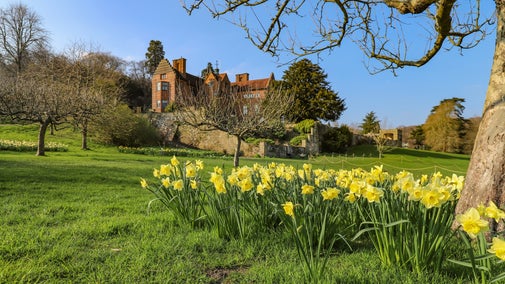
The colonialism and historic slavery report
Read our report on colonialism and historic slavery in the places and collections we care for and discover how we’re changing the way we approach these issues.


Celia Richardson, our Director of Communications and Marketing, has written a response to some recent media coverage of our report into colonialism and historic slavery that says that we are denigrating Churchill by including Chartwell, his family home in Kent, in the report. In this article she highlights the work we are doing to tell the story of this towering historical figure and why Chartwell was included in the report.
Some recent media coverage of our report into colonialism and historic slavery says that we are denigrating Churchill by including Chartwell in the report. This is not true, as anyone who reads the report can see. It’s a factual audit of the places that have direct links to colonial history and historic slavery. We are proud custodians of Chartwell, the home of Winston Churchill. Two weeks ago we celebrated the completion of a £7.1 million project to transform the way we present this precious place.
It is unfair to suggest that a factual entry in a survey report negates our work to keep Churchill’s extraordinary legacy alive, now and for future generations. We maintain deep gratitude to all those who have worked with us, and continue to support this important endeavour. We also maintain our need, as an Independent Research Organisation, to share full and accurate histories of the places in our care.
We research and share stories and histories that reflect many different sides to the places we care for. Our recent report explores the legacies of colonialism and slavery at our places and gives researchers, historians and curators a fuller understanding of these. Only by honestly and openly acknowledging and sharing those stories can we do justice to the true complexity of the past, and the role that Britain, and Britons, have played in global history.

Our report features a large number of connections and individuals with links to colonialism and slavery, including places linked to the campaign for the abolition of slavery, and those in political power during colonial administration. The report does not make judgements about people or the places in our care but makes clear the deep and wide ranging connections of colonialism and historic slavery across the centuries at our houses. It is a factual account.
The report’s reference to Winston Churchill says he was one of the longest-serving political figures in British history, he was Prime Minister twice, famously during the Second World War – a period that coincided with the Bengal Famine of 1943. It also references that he served as Secretary of State for the Colonies (1921–2) and helped to draft the Anglo-Irish Treaty at the time of the creation of the Irish Free State. The report states Churchill opposed the granting of Dominion status to India, voting against the India Bill in 1935.

The National Trust acquired Churchill’s family home of Chartwell in Kent 18 years before his death in 1965.
Chartwell is the only place in the world where visitors can see objects, many of international significance, as well many of Churchill’s personal mementoes, in their original domestic setting. Most importantly, it will remain the place where they can explore the home he loved and discover more about his extraordinary life and career. It had been the family home since 1922 and was a treasured private country retreat for a very public man.
Chartwell is one of the many places that helps to preserve the memory of Winston Churchill. A recent £7.1m project by the Trust in partnership with others has successfully enable the Trust to acquire and conserve hundreds of items once owned by Sir Winston Churchill and led to a transformation in the presentation of the former Prime Minister’s family home.
We acquired items previously on long-term loan including personal mementoes and gifts from around the world, and we have undertaken research to give a deeper understanding of Churchill’s life at Chartwell before and after the Second World War. New interactive displays share the results of the research, telling the story of the Churchill family and their guests.
One of the final parts of the project was completed during lockdown, with our curators collaborating virtually, using a scaled digital replica of Churchill’s painting studio. They curated 141 paintings and we’ve recreated his studio hang so it is now reminiscent of the early 1960s.
With the help of historic photos – and memories from the secretaries themselves – we’ve also recreated the room used by Churchill’s secretaries. Displayed as it would have been in the 1950s, the room has a mix of audio-visual interactives and original collection items.
Since Chartwell has reopened after lockdown, we’re happy to be welcoming visitors back to explore these displays and stories anew.

Read our report on colonialism and historic slavery in the places and collections we care for and discover how we’re changing the way we approach these issues.


Discover more about Churchill’s Chartwell appeal, a £7.1 million project to acquire over 1,000 of Churchill’s personal belongings which now have a permanent home at Chartwell.

Discover the beloved home of one of Britain's greatest politicians, Sir Winston Churchill. The house has many treasures and provides an intimate portrait of the Churchill family.

The Trust’s story at Chartwell began whilst Winston Churchill and his family were still in residence. Discover how we helped to preserve a significant piece of British history.

Discover more about the extraordinary life of Sir Winston Churchill in this permanent exhibition at Chartwell, including five must-see items from the curator.

Read Director-General Hilary McGrady's response to the Charity Commission's statement, which follows complaints about a report we published in September 2020.

Hilary McGrady, our Director-General, reflects on how nature, beauty and history can help us through difficult times.